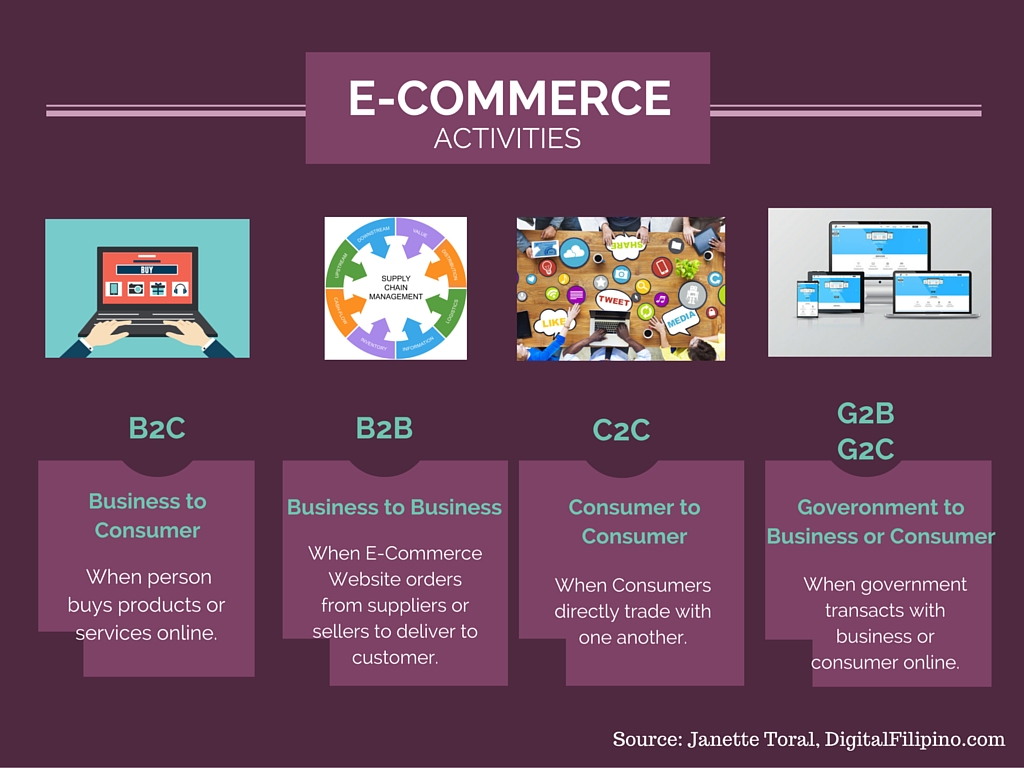E-Commerce 101
What is Electronic Commerce?
Electronic Commerce (e-commerce) is the exchange of information or transactions using any form of electronic communication. It can also be referred to as an electronic transaction.
Do I need to get a DTI permit to start an online business?
In most countries, an electronic transaction can only be referred to as an e-commerce transaction if it has commercial value.
E-Commerce = Commercial Electronic Transactions or Non-Commerce Electronic Transactions
 With the passage of the E-Commerce Law or Republic Act 8792, both commercial and non-commercial activities fall under the scope of e-commerce.
With the passage of the E-Commerce Law or Republic Act 8792, both commercial and non-commercial activities fall under the scope of e-commerce.
Section 6.b and 6.k of IMPLEMENTING RULES AND REGULATIONS OF THE ELECTRONIC COMMERCE ACT
“Commercial Activities” shall be given a wide interpretation so as to cover matters arising from all relationships of a commercial nature, whether contractual or not. The term shall likewise refer to acts, events, transactions, or dealings occurring between or among parties including, but not limited to, factoring, investments, leasing, consulting, insurance, and all other services, as well as the manufacture, processing, purchase, sale, supply, distribution or transacting in any manner, of tangible and intangible property of all kinds such as commodities, goods, merchandise, financial and banking products, patents, participations, shares of stock, software, books, works of art and other intellectual property.
“Non-Commercial Activities” are those not falling under commercial activities.
With this definition, e-commerce or electronic transaction is not limited to the Internet alone. Electronic transactions such as discussing business over the telephone, sending a fax, withdrawing money from an ATM machine, sending a text message confirming purchase or payment through cellular phone, paying for groceries using a credit card, ordering a birth certificate over the Internet, among others, are different examples of e-commerce.
Looking at it from a bigger picture, the principle is that whatever is applicable and authorized in the real world will also be treated the same in the electronic world, governed by existing laws. The E-Commerce Law empowers all existing laws by recognizing its electronic counterpart.
People who are reluctant with e-commerce often reason that they have no interest in using it. But actually, we’ve been practically doing e-commerce since the emergence of computers and telecommunication technologies. It even became more prevalent as fax machines entered our lives; retail shops implemented point of sales (POS) systems and bar coding; automated teller machines (ATM) in bank system; wireless telecommunications (mobile phone and text messaging). All of this forms of e-commerce system where human intervention is becoming less and less.
E-Commerce Activities
In a snapshot, there are four types of doing e-commerce. Let me use a simple analogy.
Business to Consumer
When you go to the supermarket, purchase your groceries and pay them over the counter, that type of service is what we would refer to as Business-to-Consumer (B2C). So when you buy books, food, groceries, CD, software, hardware from your favorite shopping web sites, that is B2C, e-commerce between businesses and consumers. With the pervasive use of mobile phone, the automated reloading of your prepaid phone card is also e-commerce and a B2C transaction.
Business to Business
The supermarket on the other hand, will need to purchase the goods, to be put on the grocery shelves, from its suppliers. The business transaction that takes place on this end is what we would refer to as Business-to-Business (B2B). So when supermarkets, bookstores, computer stores, restaurants, music outlets, purchase their goods from their suppliers either via fax, EDI, email, and other means (including paper), that is B2B, e-commerce between businesses. The same applies to prepaid phone card reload dealers who purchase prepaid credits to be loaded in their mobile phone sales unit.
With the emergence of the Internet commercially, as it started in the Philippines in 1994, e-commerce took a new manifestation and businessmen can now sell their good through ones website and close sales transaction either online or through e-mail. Websites like PinoyDelikasi.com, Load.com.ph, RegaloService.com, Lazada, OkayOkay.com, Lenddo.com.ph, Island Rose, Heartland Malls, Zalora, Chikka.com, Cashsense, and Ensogo are just some sites that sells its goods and services online.
Consumer to Consumer
E-Commerce is not limited to businesses. Individuals are also trading directly online through classified sites like OLX and portals like Ebay. Mobile C2C sites are on the rise too with Shopee Mobile and PocketMarket.
This has extended to social networks via Facebook, Pinterest, and Instagram.
Government to Business and Government to Consumer
Government has also embraced e-commerce to serve its constituency. G2B takes place when government and businesses transact online such as submitting reports to BIR or bidding on government projects through PhilGEPS.
G2C takes place when citizens orders birth or marriage documents online, books for passport renewal, or apply for NBI clearance.
There are many more variations of e-commerce activities. I hope the above 5 will help you get started in understanding it more.
E-commerce is not only for big companies. The small to medium sized companies should consider e-commerce more and has a much higher need for it. With the advent of greater global trade (GATT, ASEAN, APEC initiatives), it is imperative that small to medium sized companies automate their business to compete with foreign brands, as international and intra-regional trade will increase exponentially. Manual processes in the supply chain that are slow, redundant, unreliable, inefficient can be replaced with more efficient ones.
Entrepreneurs who sell goods and services to a global audience, can utilize the Internet as a medium. With less human intervention, Internet-based businesses are open 24 hours a day, 7 days a week that can accommodate any customer irregardless of their time zones. But of course, an Internet-based business is not just about building websites and expect profits to just come, the infrastructure to complete the sales cycle must be all covered from B2B to B2C. It is similar to building a physical branch or office but accessible to a global audience.
Further reading:
- E-Commerce ba ito?
- Puwede ka ng magtinda online
- Exciting times for Entrepreneurs to venture into e-commerce
- Pinoy E-Commerce for Real




